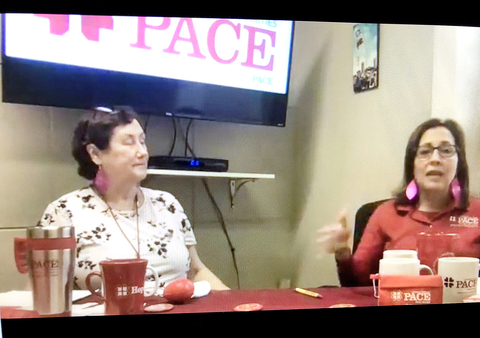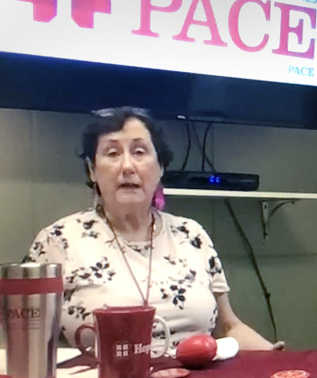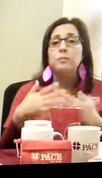
A platform that encourages healthy conversation, spiritual support, growth and fellowship

NOLACatholic Parenting Podcast
A natural progression of our weekly column in the Clarion Herald and blog

The best in Catholic news and inspiration - wherever you are!
When a caregiver gives and gives, is there anything left?
-

What is a caregiver? How can caregivers manage care for a loved one 24/7 while taking care of themselves? Is help available?
These topics were addressed recently in the Zoom session, “Heart to Heart: Caregiver’s Appreciation Event and Discussion,” by representatives of PACE (Program of All-Inclusive Care for the Elderly), a ministry of Catholic Charities Archdiocese of New Orleans. PACE occupational therapist Trisha Ventura and PACE social worker Joanne Ault led the discussion.
Caregivers need ‘self’ time
They addressed the realization of a caregiver’s changed role with their parent or spouse and stated that grief was normal. Caregivers should examine what has changed and allow themselves time to deal with the grief and to cope.

“It can be rewarding and have challenges, especially if this person is who you expected to spend your life with,” Ault said. “If it’s a parent, it’s seeing this person we love, who took care of us and was a strong person, and suddenly we have to care for them. All of a sudden you see that person in a different light.”The importance of caregivers recognizing their stress and a sense of being overwhelmed – such as not getting sleep, losing interest in once-enjoyed hobbies or not eating – and focusing on ways to care for themselves first was emphasized. Ventura and Ault presented several coping skills:
1. Take a break. Self-love is important. It’s easy to feel guilty if you take a minute for yourself. Take a deep breath; step outside and enjoy sunshine; sip a cup of coffee. “Have a chance to just be. That’s so important.”
2. Deep breathing and prayerful meditation (on life’s blessings) are important parts of caring for yourself. Waiting to respond to your loved one’s actions creates strength to respond.
“Deep breathing (five seconds slowly, in and out) is an act that is refreshing and energizing and helps with a stressful situation,” said Ventura, who gives skills to caregivers in their home. “It’s amazing how you can reset and not react. … It is something so easy that everyone can find time to do.”
Ault said caregivers should not feel guilty if they take a break to buy their favorite cupcake, read a book or even take a bubble bath – her personal favorite – or ask for help.
“You have a right to have time for yourself and take care of yourself,” Ault said. “If you don’t take care of yourself, you won’t be there to take care of the person you love. … Having that break makes a difference.”
Ault also said laughter is one of the best medicines and is a key to mood changes, so look at that silly video or TV show with your loved one.
“Try to have a moment to laugh during your day,” she said. “What a change a little laughter can do! Having a good laugh helps with all the endorphins. … It helps with sleep issues, too.”
Tips for common problems
Several participants sought suggestions for dealing with parents who wake often during the night or those who have drastic changes in moods.

Ventura proposed exploring, especially with a doctor, reasons why someone is not sleeping. General suggestions include a good daily routine with more activity and stimulation (avoiding catnapping all day); healthier eating (for both parties) and changing the scenery by moving a person to different locations inside and outside (in good weather). Better night hygiene might include restricting liquids and caffeine before bedtime.“PACE looks at the challenges and digs deeper for a trigger to the problem,” Ventura said. “There is no one-size-fits-all answer.”
Other strategies when things are difficult between the caregiver and person being cared for include redirecting a situation by starting a conversation; using simple language or loving gestures; displaying old family pictures and having the person tell stories they remember about them.
“It’s amazing how they open up and start sharing,” Ventura said. “You have this moment that is precious. You are sharing a memory together.”
Ault also said old music from their youth is often used at the PACE day centers – at the former St. Cecilia Church in Bywater and St. John Bosco Alternate Care Center in Marrero. Even non-verbal clients begin to sing along with words they learned years before.
“If you know they are going to respond to that, react in a way that will bring them joy, play it as often as you can,” Ault said. “When it is something they remember, music is a profound impact on their lives. It can change the mood; it can bring joy into your home. It is not just for the person you are loving and caring for; it’s good for you, too.”
What’s the key to caregiving?
“This role as a caregiver isn’t always overwhelming, frustrating and draining for you,” Ault said. “There are moments that bring you memories that you hold on to and carry you through the next day. It is just as important as the things you do for them.”
PACE is a comprehensive health care program that promotes independence for seniors and offers day care centers, primary and specialty medical care, medications, rehabilitative therapy, personal care services and transportation. Call (504) 835-0006 or visit https://pacegno.org.




